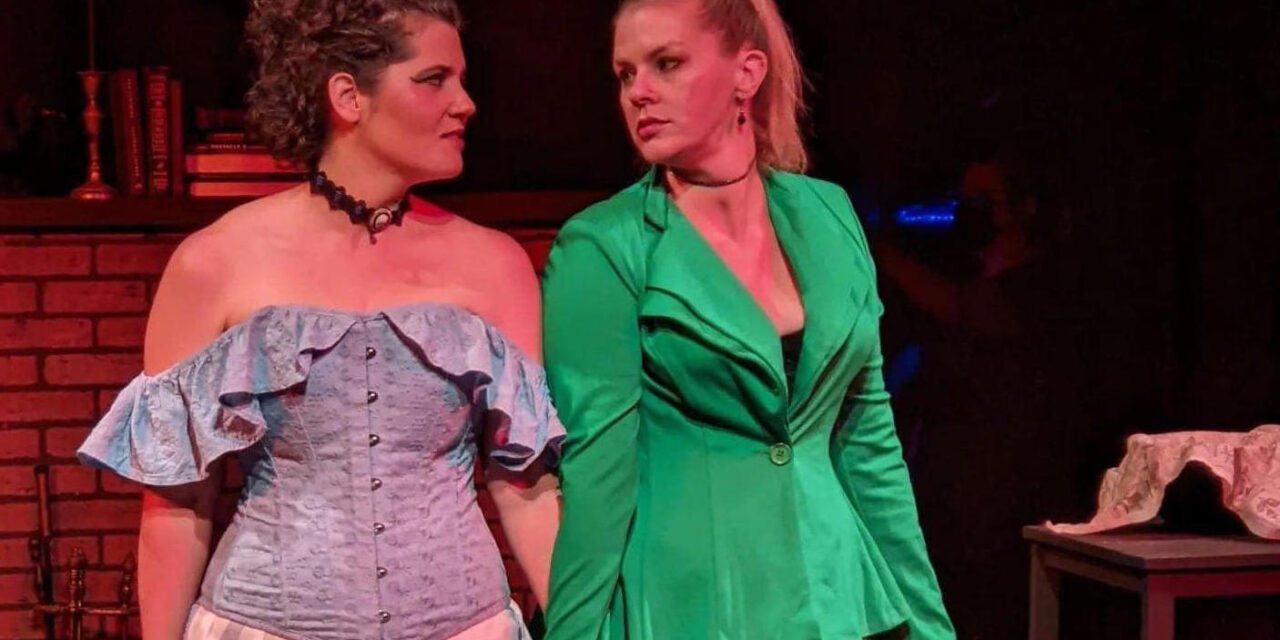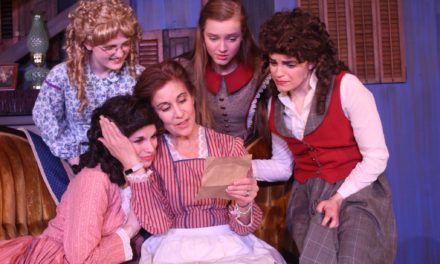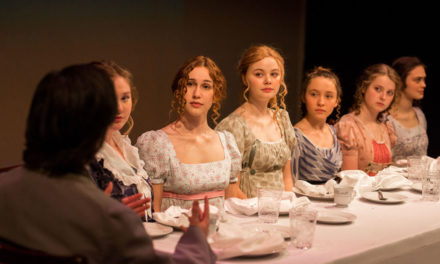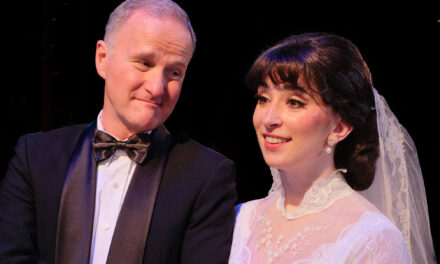Sarah Tonini & Kelley Brady in Lizzie:The Musical. Photo: Mind’s Eye
Lizzie: the Musical
Music by Steven Cheslik-deMeyer & Allen Steven Hewitt
Lyrics by Steven Cheslik-deMeyer & Tim Maner
Book by Tim Maner
Directed by Valerie Canon
A review by Keith Waits
Entire contents are copyright © 2022 by Keith Waits. All rights reserved.
In 1893, in the first celebrated murder trial in America, Lizzie Borden was acquitted of murdering her father and stepmother, but confidence in her guilt has remained constant. Ask anybody that has heard the name and they will assure you she did it. Other suspects have been considered, but over 100 years later the crime remains officially unsolved.
Lizzie: The Musical takes a perspective that suggests Lizzie (Sarah Tonini) did in fact commit the murders and that her sister Emma (Kelley Brady) and housekeeper Bridget (Mary Kate Vanegas) both knew the truth. It also indulges in the rumor, never substantiated, that Lizzie was a lesbian, here involved with neighbor Alice (Ashleigh Skaggs), although the more popular theory at the time was that Lizzie and Bridget were lovers.
But this telling of the tale leans into legend and feminist subtext. Besides the bonding between these women, it suggests Lizzie was sexually molested by her father. This idea was considered a possible motive, as well as the suggestion that Andrew Borden was going to cut his daughters out of his will in favor of the stepmother they despised, but the truth may forever elude us.
Like Bloody, Bloody Andrew Jackson, a show Lizzie director Valerie Canon staged in 2017, Lizzie: The Musical takes a freewheeling approach to history, using poetic supposition as the basis of a Post Modern, rock and roll musical about the empowerment of women, albeit with a twisted perspective. Its fair to say that the book accepts that Lizzie committed the murders but posits that it was for a greater good. It removes the sisters from an oppressive circumstance using the only avenue available to them. The prevailing reading on the acquittal is that the patronizing attitude towards women at the time made it impossible for any jury to believe that females could ever do something so savage.
Still, there was zero physical evidence connecting Lizzie to the crime, and the uncertainty has allowed Lizzie Borden to become a legend, a myth, a narrative which can be exploited by Modern Feminism thinking.
Because of this, creators Steven Cheslik-deMeyer, Allen Steven Hewitt, and Tim Maner waste no time getting down to business. The story is told only through the voices of four women, Lizzie, Emma, Bridget, and Alice, focusing on their relationship and no small amount of seething anger and resentment. Canon’s staging is spare and confident, with limited but suggestive sets built by Canon and Britt Roark, inventive and kinetic lighting design (crucial) by Nick Dent, and rich, flavorful costumes by Canon.
In the first act the women are dressed in a fair approximation of the Victorian period, but after intermission they are all dressed to express a sexuality that runs counter to the decorum of 1893. Petticoats are exposed, cleavage and calves are on display, and the colors are provocative. Somewhat curiously, Emma’s costume almost abandons the style altogether, a bold combination of skintight spandex and a smartly cut bright green jacket. The look fits the concept but sets Brady apart from the others.
Music director Nina Espinueva leads an all female band in effectively capturing the gothic horror of the score, yet it rocks out less than other productions. I can easily imagine that this was a choice tied to not having microphones in the intimate MeX Theatre. As it was the volume of the band still fell into conflict with the projection of the vocals. The four women sing very well, but the struggle is inevitable.
Sarah Tonini makes for a suitably self-absorbed Lizzie; holding secrets and losing touch with reality (Borden was receiving regular injections of morphine from the family physician), and Mary Kate Vanegas serves as a kind of narrator as Bridget with appropriate reserve. Ashleigh Skaggs’ Alice is sweet and plaintive at first, bitter and recrimantory later. Kelley Brady’s sister Emma is more limited in her impact during act one, but comes much more fully alive in act two. Many of the strongest moments come in duets; Tonini and Skaggs in a passionate emotional exchange, for example, but the score gives each of them moments to shine. Yet the final scenes drop conventionality altogether to place the characters in confrontational stances facing the audience, lit in rectangles while they adroitly alternate verses in a staccato rhythm.
Lizzie: The Musical is a highly expressionistic version of the story, one that sees Lizzie Borden through an entirely modern lens. Simultaneously lean and economical of narrative and overflowing with strong emotion, it is a loud and unapologetic statement of personal liberty taken at great sacrifice.
The show has two alternate casts. This review is of the Shattercane cast. The Velvetgrass cast is Taylor Kearschner, Jill Sullivan, Joy Beth Dewitt-Riley, & Emily Vergason.
The band: Nna Espinueva – keyboards & piano, Ava Bradley – guitar, Z Zhou – bass, Kim Fanning – cello & auxiliary percussion, Brittany Franks – drums & percussion.
Lizzie: the Musical
May 27, 28, 29, June 1, 2, 3, 4 @ 7:30 pm
May 29 @ 2:30 pm
The Mind’s Eye Theatre Company
Kentucky Performing Arts
501 West Main Street
Louisville, KY 40202
Keith Waits is a native of Louisville who works at Louisville Visual Art during the days, including being the host of LVA’s Artebella On The Radio on WXOX 97.1 FM / ARTxFM.com, but spends most of his evenings indulging his taste for theatre, music and visual arts. His work has appeared in LEO Weekly, Pure Uncut Candy, TheatreLouisville, and Louisville Mojo. He is now Managing Editor for Arts-Louisville.com.





